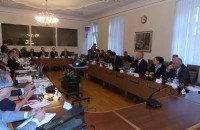Meeting of representatives of four countries’ parliamentary committees for foreign affairs held in Zagreb
 ”Croatia is near the end of the road to EU. However, this doesn’t mean that Croatia is about to exit this region. It means that even more active policy toward its neighbors is required for continuation of the process of restoration of trust and understanding, because we need a better tomorrow. Croatia’s political and economic interests remain attached to this region even after its accession to EU, which is one of the reasons why we decided to organize the meeting of presidents of parliamentary committees for foreign policy from Croatia, Bosnia and Herzegovina, Montenegro and Serbia, and present the Nordic, Baltic and Benelux model of cooperation. Igman Initiative was a great inspiration, because of its huge contribution to the process of restoring cooperation between countries of the region and overcoming consequences of wars that swept this area during the past decade.” Those were the opening words that Milorad Pupovac, President of the Parliamentary Committee for Foreign Affairs of the Republic of Croatia used to open the meeting on October 18th 2012 in Zagreb, which was attended by Presidents and representatives of parliamentary committees for foreign affairs, ambassadors of Nordic, Baltic and Benelux countries in Croatia, together with four co-presidents of Igman Initiative.
”Croatia is near the end of the road to EU. However, this doesn’t mean that Croatia is about to exit this region. It means that even more active policy toward its neighbors is required for continuation of the process of restoration of trust and understanding, because we need a better tomorrow. Croatia’s political and economic interests remain attached to this region even after its accession to EU, which is one of the reasons why we decided to organize the meeting of presidents of parliamentary committees for foreign policy from Croatia, Bosnia and Herzegovina, Montenegro and Serbia, and present the Nordic, Baltic and Benelux model of cooperation. Igman Initiative was a great inspiration, because of its huge contribution to the process of restoring cooperation between countries of the region and overcoming consequences of wars that swept this area during the past decade.” Those were the opening words that Milorad Pupovac, President of the Parliamentary Committee for Foreign Affairs of the Republic of Croatia used to open the meeting on October 18th 2012 in Zagreb, which was attended by Presidents and representatives of parliamentary committees for foreign affairs, ambassadors of Nordic, Baltic and Benelux countries in Croatia, together with four co-presidents of Igman Initiative.
”We are not embarking on cooperation because someone forced us to do so, but because it is in our best interest” – Josko Klisovic, Deputy Minister for Foreign Affairs in Croatia, said in his welcoming speech at this meeting. He pointed out that Croatia will never exploit bilateral relations to slow down any other candidate country on its path to the EU. On the contrary, Ministry of Foreign Affairs established a a Center of Excellence with a task to compile all Croatia’s experiences collected on the road to European Union and offer those compiled experiences to other countries advancing on the same path.
Zoran Pusic, co-president of Igman Initiative in Croatia got the chance to explain to the participants why Igman Initiative was the initiator of the idea to convey positive experiences from the Nordic model of cooperation to the Dayton Quadrangle area:
”This project, our overall engagement and the very existence of Igman Initiative present a kind of operationalization of the path toward something that may sound like utopia – transformation of this part of the European continent where 20th century wars began and ended into a zone of peace and prosperity. In other words, to make the notion of war between Balkan countries just as inconceivable to our grandchildren as it is inconceivable to the generations in Nordic or Benelux countries.”
First day of the meeting ended with speeches given by Ambassadors of Nordic, Baltic and Benelux countries, who had presented three models of regional integrations and cooperation.
On the second day, representatives of foreign affairs committees of the four Parliaments discussed about the presented models and agreed to continue to meet and work on devising joint steps toward further improvement of inter-parliamentary cooperation between the four countries on the basis of experiences collected from other models of regional integration.

